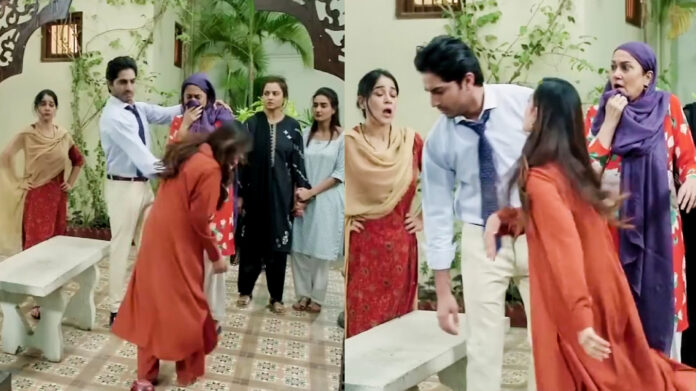In the recent promo of Geo TV’s ‘Mannat Murad’, a dramatic scene unfolded, leaving the audience grappling with conflicting emotions. Murad – played by Talha Chahour, confronts his wife Mannat – played by Iqra Aziz, demanding an apology to his mother. When Mannat refuses, Muraad resorts to slapping her in front of the family. However, the narrative takes an unexpected turn as Mannat retaliates by slapping him back. This intense scene prompts reflection on its purpose: does it serve to depict a husband’s dominance through public humiliation, or is it a deliberate effort to challenge the traditional portrayal of a vulnerable heroine?
The very scene in ‘Mannat Murad‘ has ignited a broader discussion about the portrayal of relationships on television and the messages it sends to the audience. As viewers grapple with their reactions, it prompts reflection on societal norms, gender dynamics, and the responsibility of media in shaping perceptions.
The shock factor is compounded by the fact that some social media users seem to relish this moment. One netizen expressed an eerie sense of tranquillity, stating in a post, “Ajeeb Sa Sukoon Mila Ye Dekh ke” as if they were eagerly awaiting such a turn of events. On the other hand, there were those who applauded Mannat for her bold move, asserting, “Dude asked for it, and she served him right!“
However, not everyone was on board with this narrative. Some criticized the scene, deeming the slapping part unnecessary, while others raised concerns about Muraad’s masculinity. Another user boldly stated, “Asy lerko ko shadi nh krni chahye jo apni biwi ki apny gerh mein izzat na kerwa sakyein” (Men who can’t uphold their wife’s respect shouldn’t get married).
Beyond the Screen: The Debatable Realism of Slap Scenes in Pakistani Dramas
From ‘Mere Paas Tum Ho‘ to ‘Laapata‘ and ‘Tere Bin‘, the portrayal of slap scenes in Pakistani dramas has always sparked heated debates. While some argue that it can be justified depending on the situation, the underlying truth is that violence is never acceptable. Unfortunately, such examples exist in our society, where both men and women experience these crises.
The critical point to understand is that, regardless of the circumstances, violence should never be normalized or deemed acceptable. If our drama screens continue to showcase these scenes as mere ‘entertainment,’ we risk normalizing real-life crimes and perpetuating harmful stereotypes. As viewers, it’s essential to question the impact of these portrayals on our society and advocate for responsible storytelling that doesn’t trivialize or sensationalize sensitive issues.




